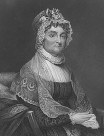|
|
 |
 |
|
Reading Guide |
| 5. |
Women on Equality
| - | "Let Democrats . . . ," poem, Newark Centinel of Freedom, 1797 |
| - | A Lady, The Female Advocate, 1801, excerpts |
| - | Abigail Adams to Judge F.A. Vanderkemp, the "black swan" letter, 3 Feb. 1814 |
|
|

Abigail Adams
|
Some women did not heed Jennings's advice to welcome a "cheerful and happy submission." Here are three of them—an anonymous political poet, an anonymous "Lady," and the never anonymous Abigail Adams. With less subordinate prose than required of their fellows in "inferiority," the free men of color, they state their right to political choice, social equality, and personal respect. And to rigorous education, the core of their demands (not pleas).
In New Jersey in 1797, women could vote in state elections, and the poem "Let Democrats" was addressed to opponents of this right. The Female Advocate is one of the more strident appeals written by women at this time (and more accessible to us than Judith Sargent Murray's 1790 essay "On the Equality of the Sexes," listed in the supplemental sites). Finally, a supreme achievement in veiled cynicism, is Abigail Adams's "polite" letter to Judge Vanderkemp, who in our times would be labelled a male chauvinist. Highly useful in the classroom. 8 pages.
Discussion questions
| · |
Describe the political and social equality to which these women insist as their right. |
| · |
To what extent do they use revolutionary rhetoric to support their appeals? |
| · |
Why are they more insistent in their appeals than the free men of color? Is their mode of debate more or less successful? |
| · |
How would the Founding Fathers, read in #1 and #2 of this section, respond to these women? |
| · |
Why is the role of anonymity in the women's campaign? |
| · | How do "A Lady," Abigail Adams, Benjamin Rush, and others see education as the vehicle for political equality?
|
» Link |
 |
 |
Topic Framing Questions
| • |
What notions of equality were held by early republican leaders? free black men? white women?
|
| • |
How did their notions of equality and rights correspond? |
| • |
How did each group mold its public voice? How did each use its power? |
| • |
To what extent did America succeed in "living the revolution" by 1820? |
|
|
 |
 |
|
 |
